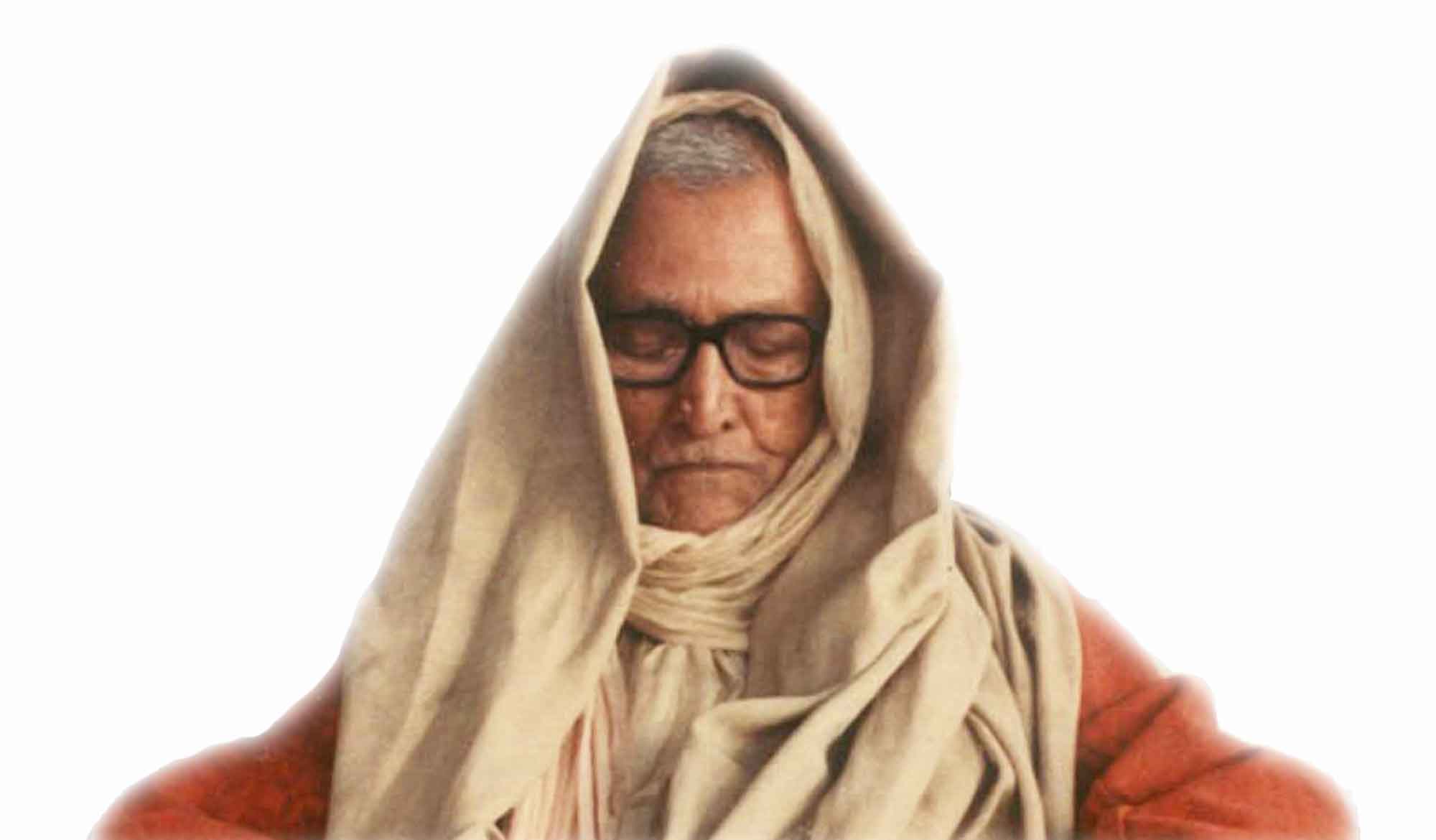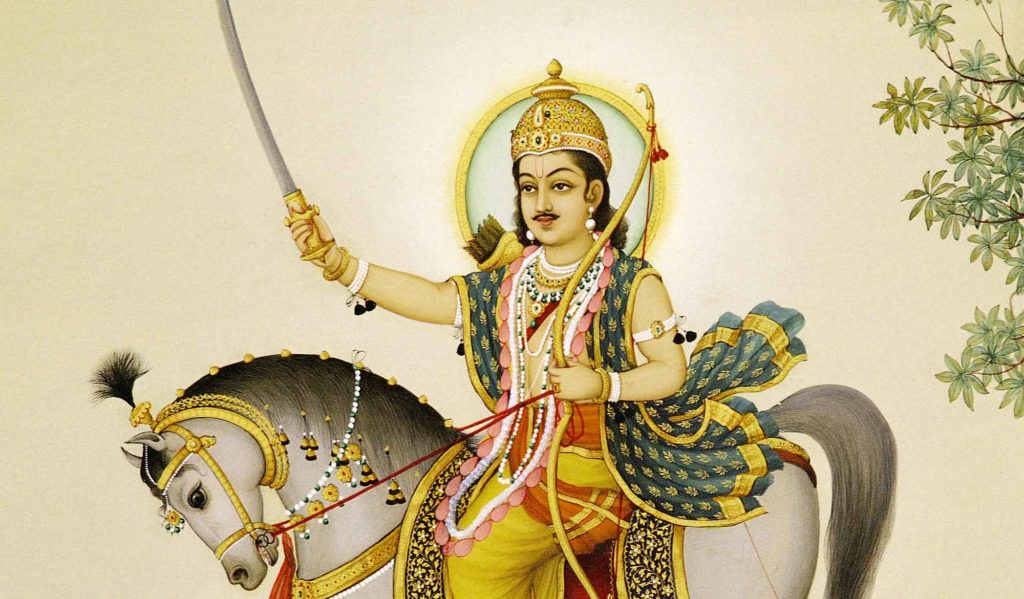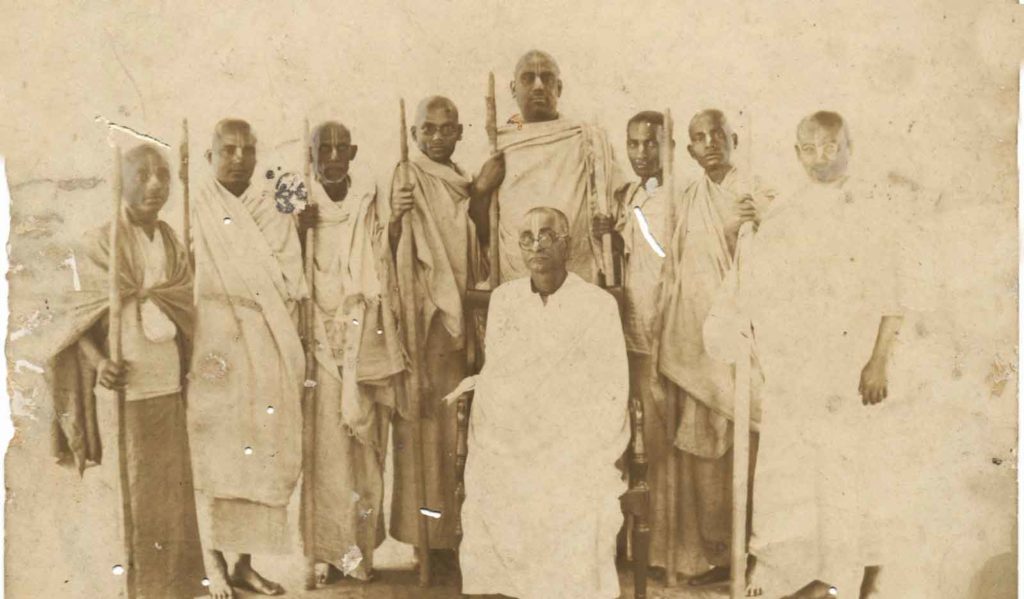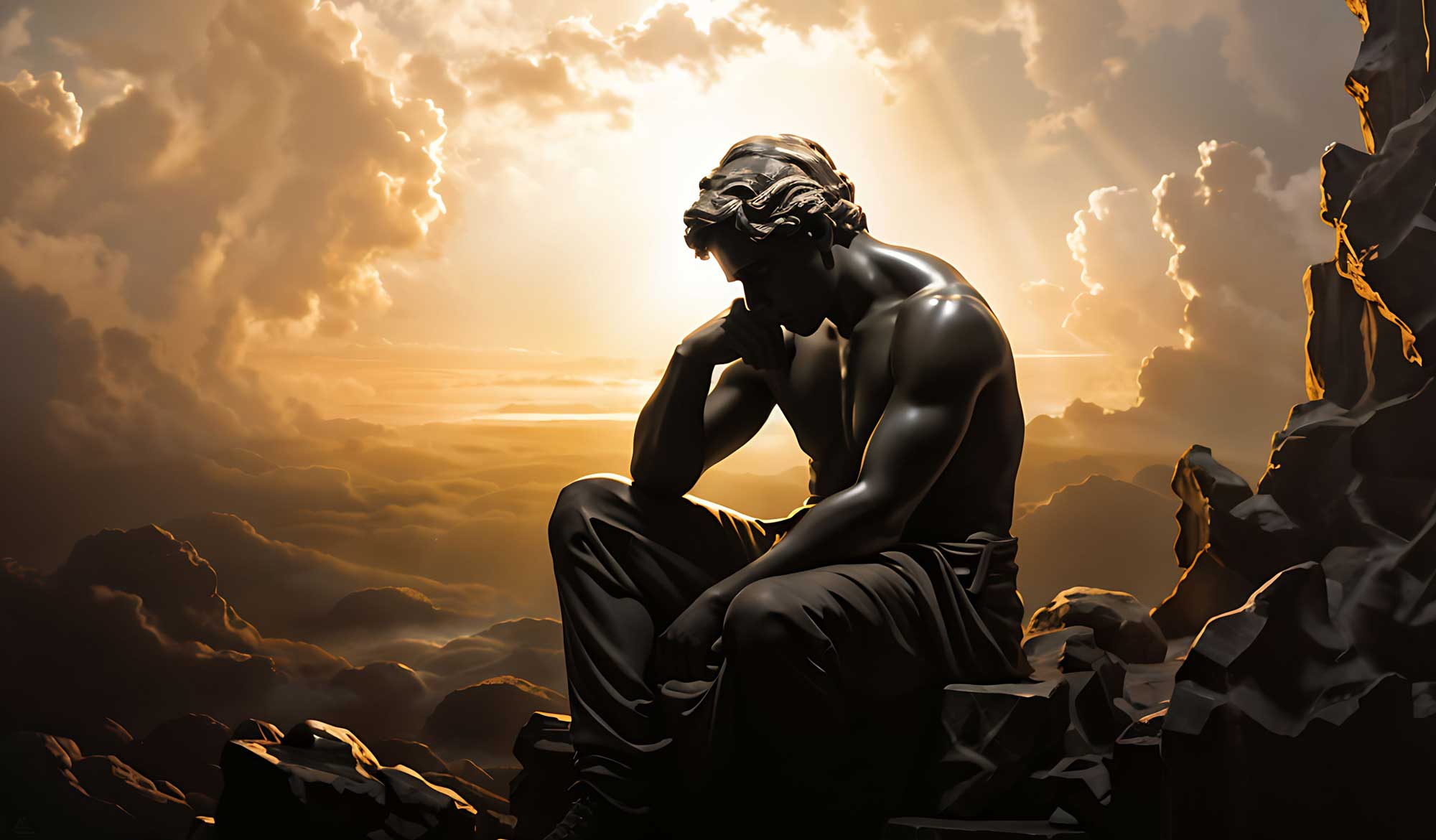Overview
In this informal talk given on 18th February 1982 at Śrī Caitanya Sārasvata Maṭha, Navadvīpa, Śrīla Śrīdhara Deva Gosvāmī Mahārāja explains how we should not venture into the details of the higher topics of kṛṣṇa-līlā and how it is not necessary to read such books as Ujjvala Nīlamaṇi in order to elevate oneself to the highest realm.
“We did not venture to enter the details of mādhurya-rasa. Our Guru Mahārāja did not like it. But it will come irresistibly within you, you go on, śravaṇa kīrtana. Pūjala rāga-patha gaurava-bhaṅge. Fools rush in where angels fear to tread. It is so high. When it will come it will awaken within you. It won’t be awakened by any other person.”
Śrīla Śrīdhara Mahārāja: Quality, that is also of innumerable kind, in differentiation and the quantity also. The degree of affinity and the teacher of affinity. Division, sub-division, sub-sub-division — branches, different branches are there. Rūpa Gosvāmī has written, especially in mādhurya-rasa he has classified in Ujjvala Nīlamaṇi. In Bhakti-rasāmṛta-sindhu the general science of devotion is given. There he takes the general development of bhakti and the highest position comes to mādhurya-rasa, it is closed there — Bhakti-rasāmṛta-sindhu, first part. And then second part, Ujjvala Nīlamaṇi. There, only mādhurya-rasa has been dealt with in detail. I have not gone through it, but only in Caitanya-caritāmṛta, and other literatures.
We did not venture to enter into the details of mādhurya-rasa. Our Guru Mahārāja did not like it. But it will come irresistibly within you if you go on with śravaṇa kīrtana. Pūjala rāga-patha gaurava-bhaṅge. Fools rush in where angels fear to tread. It is so high. When it will come it will awaken within you. It won’t be awakened by any other person.
An example was given by Gaura-kiśora Bābājī Mahārāja in a general way. Bābājī Mahārāja used to live in a very small hut on the banks of the Ganges. Another gentleman, imitating him, erected a similar cottage nearby. And physically he used to make penances like Bābājī Mahārāja — eating, not eating, taking bath, some days not taking bath, in this way physical austerity. Then Bābājī’s remark came one day to a sādhu, “Only by entering a labor room, a girl does not produce a child. It is mere imitation — many things are necessary beforehand.”
Also there is another tale. A girl talking to her mother, “Mother, when the child will come out of my womb, you please awaken me at the time.” The mother told, “No, no, you will awaken at the time. It won’t be necessary that I shall rouse you from your slumber. When the child is coming, you will awaken — it is not like that.” So the sahajiyā-bābājīs are labouring hard externally to produce some child, but our Guru Mahārāja told that it is not an easy thing:
muktānām api siddhānāṁ nārāyaṇa-parāyaṇaḥ
su-durlabhaḥ praśāntātmā koṭiṣv api mahāmune
“O great sage, amongst millions who have attained liberation and perfection, one may be a devotee of Lord Nārāyaṇa. Such devotees, who are fully peaceful, are most rare.” (Bhāg. 6.14.5)
It is the highest of the high. So don’t allow yourself to venture, to run toward that. The day will dawn by the grace of the Lord when you will not be able to resist that thing. That tendency within you will come, so you go on – ihāṅ mālī sece nitya śravaṇādi jala (Cc. Madhya 19.155). The duty of the mālī (gardener), of the disciple, is to pour water onto the root, and natural growth there will be. Then the fruit will come down and from here he will taste it. So don’t venture to rush into that.
Ujjvala Nīlamaṇi is a book where only mādhurya-rasa has been dealt with in detail. And very shortly that is given here and there in Caitanya-caritāmṛta in a well-guarded way. We will approach from there (Caitanya-caritāmṛta) and whatever little we have heard from the lips of our Guru Mahārāja. That is enough and one day we may be allowed to enter that domain in some life.
In Ujjvala Nīlamaṇi there is goṣṭha-sakhī, narma-sakhī, priyā-sakhī – in this way so many groups of sakhīs. And there are mañjarīs, a different department. So many things are there. That is on our head, on the upper side of our attainment, we are hoping. But we do not want to enter there unnaturally as a test person — then everything would be spoiled. We are not ready to spoil our fortune. Whatever we have attained. There is so much there, so much. Any greater prospect, which is impossible for mankind to reach, then why should I be so ardent and impatient to spoil my prospect? Don’t spoil it! What we have attained, that is enough, that is enough food. And if we do not find any food there, if we run to find that food, that will be treachery. Eagerness is good, but rushing is foolish.
Cakravartī Ṭhākura has given the gist in three of his summary books, Kiraṇa, bindu and kaṇā. Bhagavatamrta-kanika and Ujjvala Nīlamaṇi-kirana. Kiraṇa – a ray of the gems, maṇi – the lustre of the gems, and bindu – a particle of nectar. Bhakti-rasāmṛta-sindhu-bindu — a drop of water of the ocean. Kiraṇa, bindu and kaṇā. There he has mentioned in very short sketches. Hare Kṛṣṇa! Gaura-haribol!
Bhakti Sudhīra Gosvāmī: If there is no one…if Śrīla Bhaktisiddhānta Sarasvatī Ṭhākura did not approve of his disciples to read such a book as Ujjvala Nīlamaṇi, then who was the book written for?
Śrīla Śrīdhara Mahārāja: (laughs) We are not atheists that before reading that book, if I die, my prospect is gone forever! Don’t think like that! If I am there in the soil, I am safe. One day I must get that. He (Bhaktisiddhānta) gave me some hints. He gave admission by requesting me to sing the song of Rūpa Mañjarī. I may think that he has given, at least many of our friends told that, “He has given you admission.” A gatekeeper, by the name of Bhakti Rakṣaka. They say that I am the protector, but I think that I am a gatekeeper. By this name he has appointed me as a gatekeeper. Who will go in, he wants to see. So, I am not giving passport or visa to anyone and everyone.
vaikuṇṭhera pṛthivy–ādi sakala cinmaya
māyika bhūtera tathi janma nāhi haya
“The earth, water, fire, air and ether in Vaikuṇṭha are all fully spiritual. Material elements cannot be found there.” (Cc. Adi 5.53)
We are to be conscious that the soil of that land is more valuable than that which we are made of, we the taṭasthā-jīvas. The material by which we have been created, and where we want to enter – that is a more valuable type of material – the water and the earth. They have everything. If I am not a traitor to this sort of understanding, then how can I venture? I am allowed to go. I am required to go over and put my footsteps on that which is more pure and venerable for me. I will do this only for the necessity from that region, that is free. It is not so cheap, it is most valuable.
Jīva Gosvāmī has mentioned in the Sandarbhas why Śukadeva did not take the Name of Rādhārāṇī in the Bhāgavatam. He came, he approached and almost was going to take Her Name, but he shuddered and pushed back. Thinking about the characteristic of the audience, Śukadeva started to take the Name, but again he came back, “No!” That is Jīva Gosvāmī’s thought on this. As he preaches, we must follow that.
Pūjala rāga-patha gaurava-bhaṅge. So our Guru Mahārāja is said to be an incarnation of Jiva Gosvāmī. Su-vicāraka iva jīvaka. Whatever I heard, I put it in his poem, and also in another place:
raghu-rūpa-sanātana-kīrti-dharaṅ
dharaņī-tala-kīrtita-jīva-kavim
“He is the illustrious personality who raises the flag that attests to the glory of Śrī Rūpa, Śrī Sanātana, and Śrī Raghunātha Dāsa; he sings the glories of the powerful personality of brilliant erudition, Śrī Jīva, throughout the world.” (Śrī Śrī Prabhupāda-padma Stavakah 7)
Our Guru Mahārāja was the protector of the bhakti-rasa and rāga-patha as Jīva Gosvāmī did — jīvādyair abhirakṣitaṁ. That is high above, and he tried to prove that with evidence from different scriptures — from the Purāṇa, Tantra, Veda, Upaniṣad and Mahābhārata. Jīva Gosvāmī’s function was to prove that what Rūpa and Sanātana gave is the highest in the theological world. To prove that — that was his function. And our Gurudeva’s function was similar, to prove that it is above. “Come to understand this test, and understand it with me. Come! I won’t allow you to spread blasphemy about this. That is my duty. And Gauḍīya Maṭha is mainly for that. That it is high, higher than the highest. And you all must come to fight in the lower position, the lower plane.”
Śrutibhir vimṛgyām – all the śruti, the revealed truth, are only showing that direction. That is the position of the sage – śrutibhir vimṛgyām. They are particularly showing the direction only and not entering into analysing and testing it, not like that. It is so valuable, it is adhokṣaja. It is the hand of Śrī Kṛṣṇa Himself. It must not be undervalued, undermined. That is the danger in this – the danger of undervaluation. That must be guarded with all our might. And it is self-effulgent. When it will come, it will awaken in one’s heart. Aprahita – it is irresistible. And then it will be full-fledged, it will be natural, it will be a natural growth. One won’t be able to return to catch the reins of his progress. It will be so natural. You will find that you are surrounded by that plane. No help. It is such — it will come down. The higher atmosphere will come down to surround you.
By myself, in the lowest order, I have some experience of the adhoksaja knowledge. One day I was sitting on that chair there and talking with Manobhirāma Prabhu and Sajjanānanda. Suddenly I found that some subtle plane of knowledge came down and captured my whole consciousness, my limited consciousness, as if it was surrounded. And even at the bottom, I felt that I was at the disposal of that higher knowledge, so much so that I melted down for a few seconds, perhaps a minute, then it vanished. I began to relate this to those two, “Now I am experiencing some wonderful thing. That higher consciousness has come down, and it has surrounded me on all sides. I think my ego is in another atmosphere, and that is something like mist, but that is conscious.” It was not any other thing. It was of a higher substance than I am, higher than my knowledge, I felt it. Then I thought, “We are told that when one is going to Vaikuṇṭha in a chariot, the easiest token (ticket) of the chariot comes from surrendering. It is coming suddenly and I felt myself helpless. Wherever it will go, I am captured. A captive and I shall have to go there. Wherever this higher consciousness will go, I am a captive within that, in a cell. I shall have to go – there is no other alternative. That is adhokṣaja. A higher consciousness came down, and within and without myself I found that thing. Anyhow, it was my feeling, that it was a higher consciousness coming down, surrounding me and I was a captive in its hand. And wherever this will go, I will go, I have to go as a captive. That was my feeling at that time.
Previously also, I had some conception what is soul, what is Kṛṣṇa Consciousness. A flash came – but this is outside. A sudden flash of knowledge came. I am here and it is outside. Some flash came and went. This Viśvarūpa-adhyāya in Bhagavad-gītā, Trayodaśa-adhyāya –
sarvataḥ pāṇi-pādaṁ tat sarvato ‘kṣi-śiro-mukham
sarvataḥ śrutimal loke sarvam āvṛtya tiṣṭhati
“His hands, legs, eyes, heads, faces, and ears pervade all directions. Thus He exists, pervading all.” (Gītā 13.14)
That sort of conception of the Lord suddenly came as a flash and went away, vanished. That is all an external experience, bodily conscious experience. But this time I felt I was a captive of that. Higher knowledge is possible, knowledge which is not an object to us. I am a subject and that is an object. Generally things are like that – high or low. I am a subject. But if we are to enter Vaikuṇṭha, we area lways surrounded by our guru. Above or below, the whole atmosphere is like that – the land of gurus. Everyone is to be served and no one is to enjoy or exploit. The whole atmosphere is to be served. I am the only servant, and it is required that I shall serve the whole environment.
And to enter into that plane, do I have such faith in me, faith of that standard? Faith that there may be such a place, where from the bottom to the top, everything of consideration is all-venerable, and I am to serve all of them? I am the only servant, and the whole environment is to be served? We must have such a feeling first. Otherwise I am a disbeliever, an enemy to the cult of devotion proper. I can’t be such a traitor. I am a disbeliever if I can’t believe in this. That Para-vyoma is a sphere which is constituted of units which are all-venerable to me. Then, how can I enter there? I am called there only by the plea of service – “Come to serve Me.” Only then can I go there. Otherwise I cannot put my foot in that realm. So I believe this. Svalpam asy asya dharmasya, trāyate mahato bhayāt.
There must be faith that such things are existent — the all-venerable side. The whole side is venerable, such things exist. Such firm faith — that is enough.
Related Articles and Books
- 📖 Prākṛta-rasa Śata-dūṣaṇī – One Hundred Condemnations of Material Rasa (Book)
- 📖 Prākṛta-rasa Āraṇya Chedinī: Cutting the Jungle of Misconception (Book)
- 📖 The Authorized Sri Caitanya Saraswata Parampara (Book)
- Bhāi Sahajiyā (Part One) by Śrīla Bhaktisiddhānta Sarasvatī Ṭhākura
- Bhāi Sahajiyā (Part Two) by Śrīla Bhaktisiddhānta Sarasvatī Ṭhākura
- Vikrīḍitaṁ vraja-vadhūbhir by Śrīla Bhaktisiddhānta Sarasvatī Ṭhākura
- Ujjvala Nīlamaṇi by Śrīla Bhakti Rakṣaka Śrīdhara Deva Gosvāmī
- Fools Rush In Where Angels Fear to Tread by Śrīla Bhakti Rakṣaka Śrīdhara Deva Gosvāmī
- The Internal Meaning of Ratha Yātrā and Nāma Bhajana by Śrīla Bhakti Pramoda Purī Gosvāmī
- The Rāga-Patha is Above All by Śrīla Bhakti Gaurava Narasiṅgha Mahārāja
- Gītā-Govinda of Jayadeva Gosvāmī by Śrīla Bhakti Gaurava Narasiṅgha Mahārāja
- Gīta Govinda Revisited by Śrīla Bhakti Gaurava Narasiṅgha Mahārāja
- The Proof of Your Devotion by Śrīla Bhakti Gaurava Narasiṅgha Mahārāja
- Vraja Bhāva by Śrīla Bhakti Gaurava Narasiṅgha Mahārāja
- Anartha Nivṛtti by Śrīla Bhakti Gaurava Narasiṅgha Mahārāja
- Hearing From a Rāsikācārya by Śrīla Bhakti Gaurava Narasiṅgha Mahārāja
- The Standard for Higher Līlā Swami B.V. Giri & Swami B.B. Viṣṇu
- Conquering Anarthas by Dhīralalitā Dāsī
Further Reading
Prema Dhāma Deva Stotram with the Narasiṅgha Sevaka Commentary – Verses 61-65
In verses 61 to 65 of 'Prema Dhāma Deva Stotram', Śrīla Śrīdhara Mahārāja narrates the pastime of Śrī Caitanya at Caṭaka Parvata In Purī and explains how the scriptures produced by Brahmā and Śiva are ultimately searching for the personality of Mahāprabhu who is merciful too all jīvas, no matter what their social position.
Prabhupāda Śrīla Sarasvatī Ṭhākura’s Visit to Ayodhyā
With the forthcoming observance of Śrī Rāma Navamī, we present 'Prabhupāda Śrīla Sarasvatī Ṭhākura’s Visit to Ayodhyā' written by Śrīla Bhaktisiddhānta Sarasvatī Ṭhākura Prabhupāda from The Gaudīyā magazine, Vol 3. Issue 21/ In December 1924, after visiting Benares and Prāyāga, Sarasvatī Ṭhākura visited the birth-site of Śrī Rāmācandra in Ayodhyā.
Śaraṇāgati – The Only Path to Auspiciousness
In this article, 'Śaraṇāgati - The Only Path to Auspiciousness', Dhīra Lalitā Dāsī analyses the process of śaraṇāgati (surrender) beginning with śraddhā (faith). She also discusses the role of śāstra and the Vaiṣṇava in connection with surrender.
Ātma Samīkṣā – The Value of Introspection
In this article, "Ātma Samīkṣā – The Value of Introspection" Kalki Dāsa highlights the importance of introspection in the life of a devotee and especially in relation to the worldly environment that surrounds us. He also explains how transcendental sound influences our capacity to introspect.
Prema Dhāma Deva Stotram with the Narasiṅgha Sevaka Commentary – Verses 61-65
In verses 61 to 65 of 'Prema Dhāma Deva Stotram', Śrīla Śrīdhara Mahārāja narrates the pastime of Śrī Caitanya at Caṭaka Parvata In Purī and explains how the scriptures produced by Brahmā and Śiva are ultimately searching for the personality of Mahāprabhu who is merciful too all jīvas, no matter what their social position.
Prabhupāda Śrīla Sarasvatī Ṭhākura’s Visit to Ayodhyā
With the forthcoming observance of Śrī Rāma Navamī, we present 'Prabhupāda Śrīla Sarasvatī Ṭhākura’s Visit to Ayodhyā' written by Śrīla Bhaktisiddhānta Sarasvatī Ṭhākura Prabhupāda from The Gaudīyā magazine, Vol 3. Issue 21/ In December 1924, after visiting Benares and Prāyāga, Sarasvatī Ṭhākura visited the birth-site of Śrī Rāmācandra in Ayodhyā.
Śaraṇāgati – The Only Path to Auspiciousness
In this article, 'Śaraṇāgati - The Only Path to Auspiciousness', Dhīra Lalitā Dāsī analyses the process of śaraṇāgati (surrender) beginning with śraddhā (faith). She also discusses the role of śāstra and the Vaiṣṇava in connection with surrender.
Ātma Samīkṣā – The Value of Introspection
In this article, "Ātma Samīkṣā – The Value of Introspection" Kalki Dāsa highlights the importance of introspection in the life of a devotee and especially in relation to the worldly environment that surrounds us. He also explains how transcendental sound influences our capacity to introspect.








